Stories
Kiri Nathan
2010- (label)
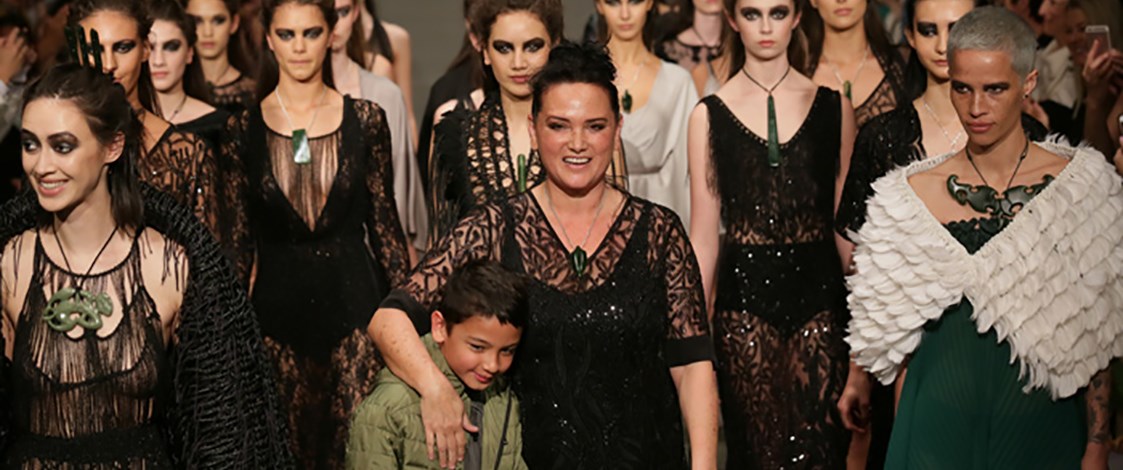
For 18 years Kiri Nathan won awards and accolades for her designs; her entries a welcome creative outlet while she juggled raising a family and working as a flight attendant. But in 2008 after winning Style Pasifika, Kiri decided to make a go of it. With a strong vision of what she wanted, she returned to the marae to learn the art of korowai and enrolled at Unitec to learn traditional raranga.
Kiri’s love for making clothes developed as a child when she watched her grandmother Inez Fullerton and mother Rozelle Fullerton make their own clothes. Kiri moved in with her grandmother in St Heliers, Auckland after her parents divorced. Inez was a seamstress who loved dancing and fashion. She was in awe of Hollywood stars like Fred Astaire and Ginger Rogers and as a young woman she would make herself a new dress every Friday to wear to the Saturday night dance.
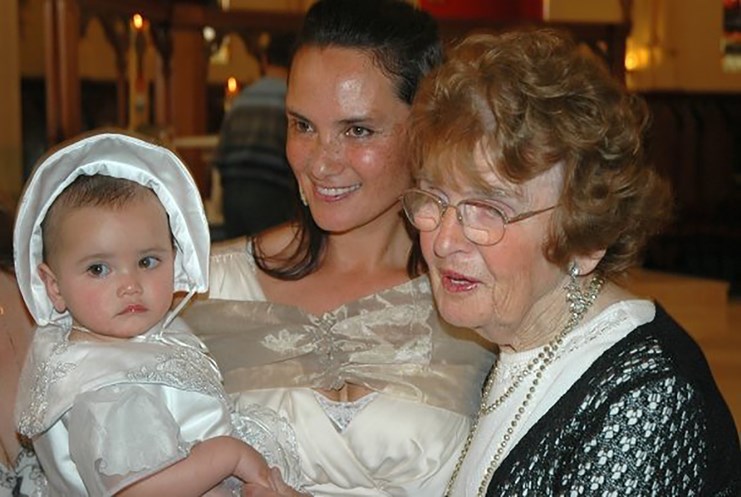
Kiri with her daughter and grandmother Inez Fullerton. Image © Kiri Nathan.
Kiri’s grandmother made beautifully crafted clothing from Ace patterns, while her mother could draft patterns freehand onto newsprint. "Grandma had a beautiful take on how women should dress and hold themselves," Kiri explains. "Her relationship to fashion, and her intimate understanding of construction and fabrics was a huge part of my early development; as was watching my mother use fearless creative energy to develop garments."
Kiri observed her mother and grandmother’s different approaches to making clothes. "Grandma created from structured patterns and obeyed all the rules whilst mum broke all the rules and relied on creative vision. Both of these learnings were invaluable. The design process was very normal to me from an early age."
Kiri learnt more about design processes when she enrolled in a three year Diploma in Visual Arts at Manukau Institute of Technology where she majored in fashion. Kiri was taught by tutors Kim Fraser and Deborah Crowe, as well as other creatives including Arnold Manaaki Wilson, Lisa Reihana, Ellie Eagle and John Pule.
Kiri found the course both enlightening and challenging. Alongside practical skills of sewing and design techniques, a failed assignment provided her with lessons about resilience and the importance of hanging onto her individuality. Kiri made a black silk dress with hand sewn kōwhaiwhai patterns in woven braid. "I failed that assignment, but loved the dress and the kaupapa in the story, so I entered it into the Creative Youth Awards and won the Womenswear section and the overall Supreme award. What I took away from that experience is that you will always be judged and there will always be people who don’t connect to your story or aesthetic … and that’s great! It’s just very important to come back to your purpose, your why and your puku (instinct) around what is best for you."
After graduating in 1995, Kiri chose not to work in the fashion industry as she needed a reliable income being a single mum with a young son, Astley. A job as a flight attendant for Air New Zealand provided the financial security she needed. But she continued to sew and regularly entered her designs into competitions. She placed and won many accolades at Cult Couture, New Zealand Wearable Arts and the Smokefree Fashion Awards. In 2008 she won the Style Pasifika award that was to give her the confidence to start her own label. One of the judges, WORLD designer Francis Hooper, said the winning garment was rare and made with care, love and integrity.
"The inspiration for the entry into Style Pasifika was an image of my grandparents as a young couple - Grandpa had his army uniform on. I created a contemporary female expression of that image. My very ill 85-year-old grandmother, Inez, was in attendance when the Prime Minister presented me with the Supreme award. It was a full circle moment and a very emotional time for our whānau."
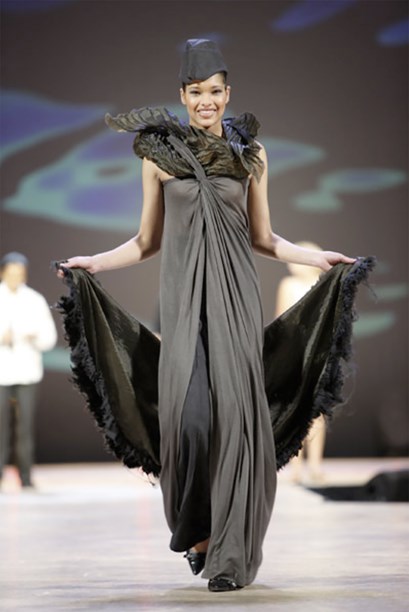
Kiri Nathan's winning design, 'Te Aria', at Style Pasifika in 2008.
The award coincided with what Kiri describes as the first step towards the belief that creativity was part of her life purpose. She had met her husband Jason Nathan and his daughter Ahmardia in 1998. They married and went on to have three more children, juggling family life with steps towards starting a bespoke Māori clothing, weaving and pounamu (New Zealand greenstone) label. Kiri made the clothing and woven garments, while Jason carved pounamu jewellery.
Embed from Getty ImagesSome steps were easier than others and they found the entry into the mainstream New Zealand fashion industry incredibly challenging. "High-end, start-up fashion labels all face major challenges, mostly around capital, resources and manufacture. We had the added challenge of introducing a label owned and run by Māori with a strong Māori ethos and aesthetic. There were no reference points; no one knew what box to put us in as we didn’t fit anywhere." Winning the inaugural Miromoda competition in 2009 gave her the opportunity to show at New Zealand Fashion Week, but the label still didn’t secure any stockists or supportive relationships. In fact it highlighted the isolation within the fashion industry and lack of diversity and authenticity around cultural integrity.
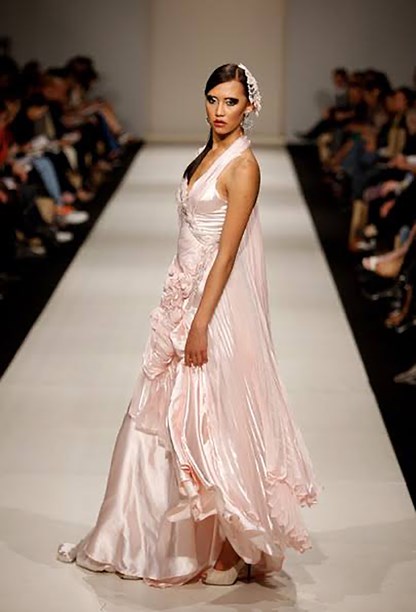
Design by Kiri Nathan on the runway at Miromoda, 2009. Image courtesy of Kiri Nathan.
To support the label’s growth, Kiri registered for a Te Puni Kōkiri business course and registered the label as Kiri Nathan Ltd in 2010. Two years on they found their first stockist - a new boutique on High Street in Auckland. Unfortunately the relationship didn’t last long. "One of the established labels said they would pull out if the Māori label wasn’t let go – so that retail experience was short lived!" It was back to selling via word of mouth and private events.
The same year they worked with fashion entrepreneur Annah Stretton where they learnt more about manufacturing and distribution within New Zealand. "These years were lessons in what worked for the Kiri Nathan label and what didn’t. They were hard but necessary."
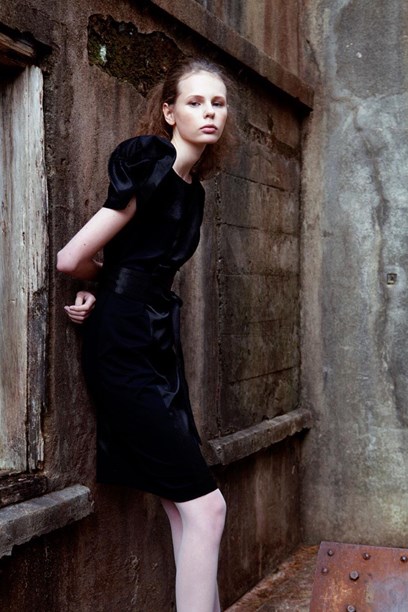
A Kiri Nathan for Annah Stretton dress. Photo by David K Shields.
Kiri had met the British High Commissioner to New Zealand, Vicki Treadell, during the 2011 Rugby World Cup and in 2013 she received an invitation from the British Council and British Fashion Council to the London Fashion Week International Showcase; the label’s first international outing.
Two designs by Kiri Nathan for London Fashion Week, 2013. Photos by David K Shields, model Yasmin. Images © Kiri Nathan.
Tapping into an international clientele had always been a goal. They recognised that e-commerce could further that objective and allow them to work around the needs of their whānau, so in 2014 they created their online store.
Active engagement with social media platforms also led to a number of incredible opportunities. In 2013 Kiri and Jason met Beyoncé and gifted her their pounamu and kākahu, including a piece for her daughter Blue Ivy. "Indigenous people get indigneous people; it’s an unspoken knowing and connection. So the way this opportunity presented itself and the way it was received was absolutely beautiful," Kiri says.
Over the next few years the business grew with Kiri’s designs seen on celebrities including Mariah Carey and Demi Lovato. She also worked for Walt Disney to design the dress worn by Auli’I Cravalho, the voice of Moana, at the film premiere.
Watch Kiri Nathan talk about her design for Auli’i Cravahlo’s 'Moana' movie premiere gown.
2018 was a huge year for the label. Kiri dressed the Prime Minister, Jacinda Ardern, twice during the royal visit to New Zealand and their pounamu piece was gifted to the Duchess of Sussex. She also presented her first solo show at New Zealand Fashion Week after a five year hiatus from the catwalk. Kiri, Jason, friends and whānau pulled a full runway showing together in four weeks and were rewarded with a standing ovation from a full house. In 2019 Kiri was back on the runway, showing by invitation at Thai Silk Fashion Week, an initiative led by Thailand’s Queen Sirikit.
Kiri Nathan show at New Zealand Fashion Week, 2018. Images courtesy of Kiri Nathan.
One of the label’s biggest opportunities has come from China. The country is a new market for the label and also a source of unique fabric. Kiri and Jason have frequently returned since their first visit in 2014 and in 2017 they shared their experience and connections by taking a group of Māori designers with them.
After more than a decade running a fashion business, Kiri has a lot of knowledge and experience to share. She is on the boards for Super Diverse Women and the 'I Have a Dream' Charitable Trust. Early in 2019 Kiri formalised her trips taking Māori designers to China by setting up the Kāhui Collective. In 2019 the designers visited fabric manufacturers and international buyers. The trip included a photoshoot on the Great Wall of China and the back alleyways of China’s fabric markets where photographer Damien Nikora captured garments by each of the designer.
Kaikohe designer Kohi Woodman was of the designers who travelled to China as part of the Kāhui Collective. Kohi started her label, IndigenousASF, not long before the trip and found the networking and experience of working alongside experienced designers invaluable. "This type of opportunity isn't usually offered to a working māmā of six from small town New Zealand. Kiri and Jason have authentic stories and advice and the self-belief that has grown inside of me is crazy!"
Through the Kāhui Collective, Kiri is providing the community and support system she felt was lacking when she started in the industry. As well as sharing her own experience, the twelve month mentorship programme brings in specialists to deliver workshops covering cultural responsibility, tikanga Māori, manufacture, design development, Māori intellectual property, te reo Māori, sustainable fashion, ethical fashion, ethical sourcing and well-being.
Kiri’s leadership was formally recognised in September 2019 with a Blake Leader Award, and not long after, she won the supreme award at the Māori Business Women Awards.
This recognition for her hard work is welcome as she continues to face challenges with time and also income. "All of my charity work is just that, unpaid haha! So as a business that is still in growth mode, it’s difficult to have your oxygen (cashflow) supply jeopardised by alternative focuses. Time and energy come into play with our tamariki; they have sports, school and lives that shouldn’t be put at risk because I choose to give so much elsewhere, so the juggle is always very real and we try and keep ourselves accountable for that constantly."
Nonetheless Kiri feels incredibly lucky to now be seeing the results of their hard work. They have generated a loyal following built on being true to themselves, their culture and their global vision.
Text by Kelly Dix, banner photo of Kiri Nathan's show at New Zealand Fashion Week 2018 © Lyle Adams.
Published November 2019.